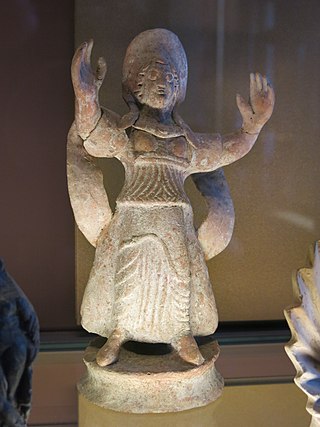Year 135 BC was a year of the pre-Julian Roman calendar. At the time it was known as the Year of the Consulship of Flaccus and Piso and the Sixth Year of Jianyuan. The denomination 135 BC for this year has been used since the early medieval period, when the Anno Domini calendar era became the prevalent method in Europe for naming years.

Pharnaces II of Pontus was the king of the Bosporan Kingdom and Kingdom of Pontus until his death. He was a monarch of Persian and Greek ancestry. He was the youngest child born to King Mithridates VI of Pontus from his first wife, his sister Queen Laodice. He was born and raised in the Kingdom of Pontus and was the namesake of his late double great grandfather Pharnaces I of Pontus. After his father was defeated by the Romans in the Third Mithridatic War and died in 63 BC, the Romans annexed the western part of Pontus, merged it with the former Kingdom of Bithynia and formed the Roman province of Bithynia and Pontus. The eastern part of Pontus remained under the rule of Pharnaces as a client kingdom until his death.

Mithridates or Mithradates V Euergetes was a prince and the seventh king of the Kingdom of Pontus.

Manius Aquillius was a Roman politician and general during the late Roman Republic. He was a member of the ancient Roman gens Aquillia, probably a son of Manius Aquillius, consul in 129 BC. Aquillius served as Consul of Rome with Gaius Marius in 101 BC. Before his consulship, during the Cimbrian War, he had served as a legate under Marius in Gaul. He played a pivotal role during the Battle of Aquae Sextiae where he surprised the Teutones by attacking them from behind. As consul he crushed a slave revolt in Sicily. At the start of the First Mithridatic War he was defeated and captured by Mithridates VI of Pontus who had him executed by pouring molten gold down his throat.
Cleopatra of Pontus was a Pontian princess and a queen consort of Armenia.

The Asiatic Vespers refers to the massacres of Roman and other Latin-speaking peoples living in parts of western Anatolia c. early 88 BC by forces loyal to Mithridates VI Eupator, ruler of the Kingdom of Pontus, who orchestrated the massacre in an attempt to rid Asia Minor of Roman influence. An estimated 80,000 people were killed during the episode. The incident served as the casus belli or immediate cause of the First Mithridatic War between the Roman Republic and the Kingdom of Pontus.

Asander, named Philocaesar Philoromaios was a Roman client king of the Bosporan Kingdom. He was of Greek and possibly of Persian ancestry. Not much is known of his family and early life. He started his career as a general under Pharnaces II, the king of the Bosporus. According to some scholars, Asander took as his first wife a woman called Glykareia, known from one surviving Greek inscription, "Glykareia, wife of Asander".

Tiberius Julius Aspurgus Philoromaios was a prince and Roman client king of the Bosporan Kingdom.

Mithridates or Mithradates VI Eupator was the ruler of the Kingdom of Pontus in northern Anatolia from 120 to 63 BC, and one of the Roman Republic's most formidable and determined opponents. He was an effective, ambitious and ruthless ruler who sought to dominate Asia Minor and the Black Sea region, waging several hard-fought but ultimately unsuccessful wars to break Roman dominion over Asia and the Hellenic world. He has been called the greatest ruler of the Kingdom of Pontus. He cultivated an immunity to poisons by regularly ingesting sub-lethal doses; this practice, now called mithridatism, is named after him. After his death, he became known as Mithridates the Great.
Dynamis, nicknamed Philoromaios, was a Roman client queen of the Bosporan Kingdom during the Late Roman Republic and part of the reign of Augustus, the first Roman Emperor. Dynamis is an ancient Greek name which means the “powerful one”. She was a monarch of Iranian and Greek Macedonian ancestry. She was the daughter of King Pharnaces II of Pontus and his Sarmatian wife. She had an older brother called Darius and a younger brother called Arsaces. Her paternal grandparents had been the monarchs of the Kingdom of Pontus, Mithridates VI of Pontus and his first wife Laodice, who was also his sister. Dynamis married three times. Her husbands were Asander, a certain Scribonius and Polemon I of Pontus. According to Rostovtzeff, she also had a fourth husband, Aspurgos.

Tiberius Julius Sauromates II Philocaesar Philoromaios Eusebes, also known as Sauromates II was a Roman client king of the Bosporan Kingdom. His coins are known from the period 172–210, probably accounting for his entire reign.
Machares was a Pontic prince and son of King Mithridates VI of Pontus and Queen Laodice. He was made by his father ruler of the Bosporan Kingdom after Mithridates, for the second time, reduced that country, after the short war with the Roman Murena, in 80 BC.
Laodice VI was a Greek Seleucid princess and through marriage was a queen of the Kingdom of Pontus.
Mithridates Chrestus was a Prince and co-ruler of the Kingdom of Pontus.
Laodice was a Pontic Princess and Queen who was first wife and sister to King Mithridates VI of Pontus. She was of Persian and Greek ancestry.
Monime, sometimes known as Monima, was a Macedonian Greek noblewoman from Anatolia and one of the wives of King Mithridates VI of Pontus.
Stratonice of Pontus was a Greek woman from the Kingdom of Pontus who was one of the mistresses and the fourth wife of King Mithridates VI of Pontus.
Adobogiona was a Galatian princess from Anatolia.
Mithridates was a son of King Mithridates VI of Pontus and his sister-wife Laodice. He was made by his father ruler of Colchis on the Black Sea, but then removed and put to death on suspicion of disloyalty.







